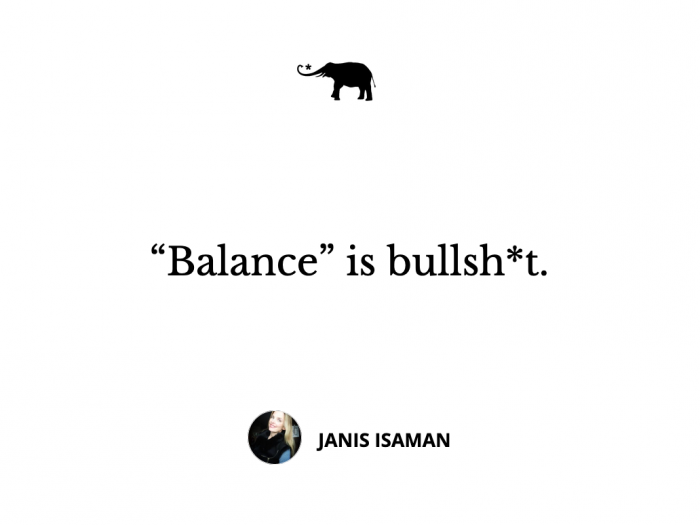I remember crying on my 25th birthday.
I felt like a failure—at everything. I had expected to live the life that my Seventeen and Cosmopolitan magazines had promised: with a relationship, a cute apartment, a dreamy job, a great figure, and great style.
I had: none of the above.
As someone who flings myself into the mud pits of obsession, I could feel impatience clawing at my chest from the inside: I had ambitions, desires, energy, and passion. My body was hot with the frustration of failed ambitions of my youth.
My tears were met with a comforting hug from a caring girlfriend who told me that: “the key is to find balance.”
I spent the next five years—unsuccessfully, mind you—seeking a mythology bestowed upon women: that we can have it all if we simply find “balance.”
I didn’t realize then what I know now: “balance” is bullsh*t.
Women are met with manual upon manual of tips and instructions, guiding us to the pinnacles of this purported “balance”:
>> We just want to be in relationships and be self-sufficient because “neediness” is a detriment but so, too, is independence.
>> We must be successful at our career but never display our drive or ambition.
>> We are to be emotional and vulnerable, yet never cross the line into hysterical or needy.
>> We must have impeccable houses but not be obsessed with cleaning.
>> We are to be sexual but not overtly so.
We are generally nudged toward some sort of effortless “I just woke up like this” call to always be “just so.” All this coaching and training is theoretically designed to help us relax into the ease of a casual idea, but it mostly sets us up for confusion, fear, triggering, and anxiety.
By the time my 30th birthday rolled around, I was tense and disordered. I was frazzled from trying to tiptoe across the ever-demanding, ever-urgent, and ever-consuming tightrope set up for women. The whole thing was just exhausting.
It never occurred to me as a child that it would be necessary to perform an adult juggling act of this nature.
I grew up on a farm, and we were supposed to do our best—try hard, be creative, and be ourselves. Periods of intense work were followed by periods of intense rest. We paid no mind to our appearance or to the gender-based roles demanded of us.
At 30, now a New York City career woman, I had to learn how to be an adult. From scratch.
I started with professional training, where I learned to be a coach. In class, I had to learn how to look inside myself. What I found there was not very balanced: I was still full of the same zest, spice, and sass that I had tried to repress in my quest for the purported societal idealization of womanhood.
I fell in love with a tool called the Wheel of Life.
Here: we cut a circle like a pizza and divide it into categories, such as creativity, career, and relationships. We evaluate each area, placing a dot toward the inside, outside, or centre. We ideally weigh the dots toward the outside, where each category of life is expressed to its fullest.
Wheels are how we move.
Balance is how we stay still.
When we drop the notion of “balance,” we find joy, pain, challenge, and growth in embracing the extremes. We move like a wheel.
We also find the fullest expression of ourselves. My body started to relax.
The ideals and idealizations about how to be enough but not too much melted away as I gained confidence in my voice, my choices, and who I was—my authenticity.
We are told to work out and watch what we eat, so our bodies can don an optimized “athletic” look, which is a cultural code for being thin but still retaining our curves: just the right ones in just the right places. “Balance” is when we achieve this supposedly ideal body but with nonchalance.
I chucked it. I worked out too much and ate too little, followed by periods where I worked out too little and ate too much. I gained weight, I lost weight, and I learned what feels great on my body, rather than following instructions about how to look or what to do to look that way.
We are cued to meet cultural standards of beauty, which generally requires cosmetics, razors, hair and nail color, and associated upkeep. But it’s societally deemed unattractive if we have overt outward signals of effort or trying. “Balanced” beauty is striking the line between too underdone and too overdone; between enjoying a day at the salon and “needing it” for maintenance of the whole charade.
I no longer cared. I wore ball gowns one day and donned Lululemon the next, and my girlfriends laughed at my extremes. I learned to look how I wanted to look—when I wanted to look that way.
I was too ambitious and then not ambitious enough.
I worked too hard and was extremely overworked or extremely under-financed.
I had a baby, doubled my workload, and halved my financial success.
I overexercised and underexercised; overcleaned and under cleaned.
And in these extremes, we learn. Like children learning to skate: we glide, and then we fall. We make mistakes and taste victory. We learn to propel ourselves toward who we really are, becoming the boss of our own decisions and lives. We learn that all areas of life are interdependent on one another to flourish: the middle ground is a place of dissatisfaction, and the extremes are where we get to embrace imperfections, find challenges, and grow.
The glory of imbalance is that we are who we are in the moment when we make a choice. We are authentic to the call of our soul.
Giving a shove off to “balance” requires an inner strength and confidence that’s off-script for a woman. But it’s also where the joy is, where the pain is, and where we get to be our damn selves.
Balance requires us to tamper with our messy hair, aging skin, emotional and relational needs. It’s a call to erase our vulnerabilities and truths, add more tasks to our overburdened checklists and force us into more coping mechanisms to hide our imperfections.
F*ck that.
Years after I embraced my imbalances for their growth potential, my hairdresser breathlessly created an “I just got out of bed” look that took three hours of professional help.
He uttered “effortlessly gorgeous,” and we laughed.
For a brief, glorious moment, I had theoretically achieved the very pinnacle of success as a woman: “balance.” I had it just right. Never mind the effort required to hold up this charade.
And then I went out to the street, and my hair caught a gust.
It lasted about three minutes, which seemed just about right.


 Share on bsky
Share on bsky





Read 59 comments and reply